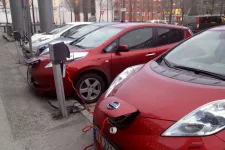(Press-News.org) Most global scenarios and governmental targets for decarbonizing the transport sector consider battery-powered electric vehicles as a main part of the solution. Enormous amounts of raw materials are needed to build enough batteries and ensure a transition to low-emission vehicles.
Access to lithium is critical, as it is used in all types of EV batteries.
Future demand needs to decrease
“It seems very likely we'll have a shortage. The key lies in the demand. The demand needs to decrease to avoid long-term supply problems,” says Fernando Aguilar Lopez, a PhD candidate at the Norwegian University of Science and Technology's (NTNU) Department of Energy and Process Engineering.
There are huge deposits of this super-light, silver-white substance around the world. The problem is that it is not being mined fast enough to keep up with demand for lithium-ion batteries (LIBs) for electric vehicles.
As a result, we may face supply bottlenecks that could last for decades.
Meet MATILDA — A model for supply scenarios
Fernando Aguilar Lopez is an expert in analysing global material flows. This means he studies raw materials cycles from extraction to production, use, and scrapping. He, postdoc Romain Billy and Professor Daniel B. Müller have developed a material flow analysis model named MATILDA (MATerIaL Demand and Availability). The model was recently introduced in the Journal "Resources, Conservation & Recycling."
The study investigates strategies to manage resource use in EV batteries. MATILDA helps to understand more of the critical factors affecting resource supply. Also, the model calculates how various interventions could mitigate the demand.
Most comprehensive model
“Society urgently needs systemic approaches for addressing supply problems,” Müller said.
MATILDA is the most comprehensive model to date for battery raw materials in the global vehicle fleet. Tools such as this can play a crucial role for industry and policy makers to develop strategies to ensure secure and resilient critical raw materials supply chains, Müller said.
Explored more than 8 000 scenarios
The NTNU researchers have explored more than 8 000 scenarios to understand the key drivers of material use.
Reading this on your laptop and want to explore the details? Check out BATMAN's interactive visualization tool, where you can build your own scenario and check the resource use for the nine materials the researchers have investigated. http://129.241.153.168:8051/
This assessment showed that profound social and lifestyle changes are the most efficient measures to reduce material supply risks.
More sharing of smaller EVs
To avoid excessive demand for single metals, we need investments in a wider range of new battery technologies, the researchers said.
Nor do we need more, larger, heavier electric cars. On the contrary, more of us should share smaller cars with small battery packs.
“Extending the lifespan of vehicles and batteries by facilitating reuse and replacement will also be crucial in reducing the demand for raw materials,” says Aguilar Lopez.
Identifying problem shifting
Reducing the demand for certain materials could increase pressure on others. MATILDA shows what happens when this kind of problem shifting happens with cobalt, nickel and lithium. The model also offers alternative solutions.
The researchers says that problem shifting may be critical if the industry collectively shifts towards a new technology at a specific time. One example is the current trend toward lithium iron phosphate batteries (LFP).
Battery trends could affect food prices
In 2021, manufacturers as VW, Volvo and Tesla said they planned to adopt LFP. These batteries are free of problematic, costly substances such as cobalt and nickel.
The downside is that they require a lot of phosphorus, an essential raw material for the fertilizer industry. Thus, an increase in demand could be susceptible to price shocks, potentially affecting small farmers, and threatening food prices.
Recycling not a solution in the near term
Another finding in the NTNU study is that although necessary, recycling will not significantly reduce the pressure on raw materials in the coming decade. Our EVs are still reasonably new, and not enough of them will be scrapped for recycling until 10 to 15 years from now.
However, MATILDA shows that primary demand can be reduced by improving efficiencies in lithium, aluminium, manganese, and phosphorus recycling. These materials are currently uneconomical to recycle and are not included in the latest EU battery regulations.
Extending lifetime can be crucial
Without incentives to recover these materials, they are likely to be lost to the environment, Aguilar Lopez said.
He adds that a key issue is that the proposed EU regulations only target the supply side, but not demand. This means that badly needed changes are not actively encouraged.
Warp speed into bottlenecks
Half of new car sales in the USA are predicted to be electric by 2030. This is also the target in a recent Executive Order issued by US President Joe Biden. In the EU, all new car sales must be electric by 2035.
Several car manufacturers have said that they will be able to make the transition several years before this deadline.
This means if we don’t take measures quickly to increase the production of battery materials, we will be driving at warp speed right into the supply bottleneck.
Bigger cars mean bigger batteries
According to this Climate and Community project report, the average battery pack in the US has increased in capacity by nearly threefold since the first Nissan Leaf hit the road a decade ago.
“We’re driving ever larger, heavier cars with massive battery packs. At the same time, we only use these vehicle actively about five per cent of the time. The rest of the time, it’s parked. Only a few of us drive further than 45 kilometres daily,” Aguilar Lopez said.
Small is beautiful
He sees a lot of indicators that fewer people need to own their own car, and that more of us could be OK with sharing smaller, lighter vehicles. In other words, we need more 30-40 kwh Nissan Leaf-type batteries instead of the 60-100 kwh batteries that are found in most Teslas and SUVs.
“Norwegian politicians have chosen to no longer subsidize the largest and most expensive electric cars. This is one example of a powerful measure that indirectly favours smaller cars,” he said.
The researcher believes that moves like this are essential and can inspire both individual countries and the EU.
More than 300 new mines needed
Analyses show that the world needs more than 300 new lithium mines by 2035 to keep up with demand. Prices have risen by several hundred per cent in a few years There is great interest in extraction, but disputes have erupted over new mines in a number of places.
The newest lithium mine in Europe opened around 10 years ago. Some reports say it may take up to 20 years to get a new one up and running. Many initiatives fail and are shut down.
“Ideally, we should have started preparing for this situation 20 years ago,” Aguilar Lopez said.
Buses and ferries worsen bottlenecks
As if that wasn't bad news enough, the new NTNU study only considers resource consumption by private vehicles. But buses, ferries, and other large vessels are also being electrified using batteries.
Machinery is another area where changes are afoot. Müller said the entire mining sector is completely shifting towards electrification and automation.
These additional demands could quickly worsen supply bottlenecks for raw materials.
“Achieving the goals set by the EU and individual countries could thus be problematic. This would also create a significant threat to the climate goals,” Aguilar Lopez said.
Promising technologies require more lithium
Although the development of highly efficient solid-state batteries is promising, they do not solve the lithium supply crisis either.
“Actually, solid-state batteries can worsen the situation, requiring more lithium per kilowatt hour — almost twice as much in some cases,” Aguilar Lopez said.
Challenges everywhere
Hydrogen fuel cells are becoming a mature technology, but they are expensive. They will be far more effective in ferries and other heavy vessels than in cars.
Lithium-free sodium-ion batteries are another promising alternative. They are in an early R&D stage, so it will take a while before they are road-ready.
“No matter where we turn, we encounter challenges,” Aguilar Lopez said.
Cities for people — not cars
So, what would be the best option to get us out of the lithium supply crunch?
Aguilar Lopez’s immediate answer is that cities should be designed for people, not cars.
“Look at Zürich, Vienna, Paris, and Oslo. Major moves are being made in many places to create more pleasant urban areas and entice more people to leave their cars. And quite a lot are doing just that. We need regulations– and of course people must accept them,” Aguilar Lopez said.
BATMAN project proposes new measures
Norway was a first mover in terms of electrifying the vehicle fleet. Thus, it is expected to be the first country to have larger amounts of spent batteries once the first EVs reach end-of-life.
Müller, Aguilar Lopez and Guillaume Billy were part of the research team for the BATMAN project, From 2019-2022. The project was designed to investigate opportunities for the Norwegian industry to engage in battery reuse and recycling.
Based on the main findings, the scientists suggested several strong actions:
Facilitate and finance a broader range of battery research geared towards breakthroughs in chemistries and recycling practices.
Step up and streamline the development of new lithium mines, also in the EU.
Increase car sharing and better public transport to reduce overall vehicle ownership.
More small cars with smaller battery packs.
Greater numbers of and more efficient charging infrastructure.
Facilitate the recycling of all materials beyond the ones that are already regulated.
Extend car and battery life via increased reuse and easier repair and replacement of batteries.
Reference: Aguilar Lopez, F..; Billy, R.G.; Müller, D.B. Evaluating strategies for managing resource use in lithium-ion batteries for electric vehicles using the global MATILDA model. Journal of Resources, Conservation and Recycling
END
To avoid a battery crisis, more of us should share small, lightweight EVs
EVs are better than fossil fuel cars, but it's not sustainable for everyone to own their own electric SUVs
2023-05-18
ELSE PRESS RELEASES FROM THIS DATE:
Space missions set to improve solar storm forecasts
2023-05-18
Satellites launched into outer space could send back improved warnings of dangerous solar storms thanks to a breakthrough in the way scientists use space weather measurements.
Experts from the University of Reading have found that using satellite data that is less reliable but is returned to Earth rapidly can be used to improve the accuracy of solar wind forecasts - which are harmful streams of charged particles sent from the sun - by nearly 50 per cent.
Their research, published today (Thursday, 18 May) in Space Weather, ...
Perfect ‘pathogen’ storm: Vibrio bacteria, Sargassum and plastic marine debris
2023-05-18
A new study uncovers how the interplay between Sargassum spp., plastic marine debris and Vibrio bacteria creates the perfect “pathogen” storm that has implications for both marine life and public health. Vibrio bacteria are found in waters around the world and are the dominant cause of death in humans from the marine environment. For example, Vibrio vulnificus, sometimes referred to as flesh-eating bacteria, can cause life-threatening foodborne illnesses from seafood consumption as well as disease and death from open wound infections.
Since 2011, ...
The importance of social media in corporate social responsibility
2023-05-18
A new study by Dr. Lucie Kvasničková Stanislavská from Czech University of Life Sciences, Prague published in PeerJ Computer Science titled ‘Global analysis of Twitter communication in corporate social responsibility area: sustainability, climate change, and waste management’ has found that social media is an increasingly important tool for companies to communicate their corporate social responsibility (CSR) efforts. The study analyzed over half a million tweets from 2017 to 2022 and identified the key topics and trends communicated in connection with CSR on Twitter.
“Our results aid enterprises in developing communication ...
SCAI releases guidance on management of in-stent restenosis and stent thrombosis
2023-05-18
PHOENIX (May 18, 2023) – The Society for Cardiovascular Angiography & Interventions (SCAI) today release an expert consensus on the management of in-stent restenosis and stent thrombosis. The statement was published online in the Journal of the Society for Cardiovascular Angiography &
Interventions (JSCAI).
In-stent restenosis is a blockage or narrowing that comes back in the portion of the coronary artery previously treated with a stent and remains a common clinical problem despite numerous improvements in stent design and polymer coatings in recent years. In addition to significant health care
costs, it is also associated with an increased risk of death and re-hospitalization. ...
Past climate change to blame for Antarctica’s giant underwater landslides
2023-05-18
Scientists have discovered the cause of giant underwater landslides in Antarctica which they believe could have generated tsunami waves that stretched across the Southern Ocean.
An international team of researchers has uncovered layers of weak, fossilised and biologically-rich sediments hundreds of metres beneath the seafloor.
These formed beneath extensive areas of underwater landslides, many of which cut more than 100metres into the seabed.
Writing in Nature Communications, the scientists say these weak layers – made up of historic biological material – made the area ...
Time of day may determine the amount of fat burned by cold exposure
2023-05-18
Short-term exposure to cold temperatures activates brown fat that burns calories and has become an attractive target to promote cardiometabolic health. Now new research being presented at this year’s European Congress on Obesity (ECO) in Dublin, Ireland (17-20 May) suggests that this biological response differs depending on the time of day and in men and women.
The preliminary study by Dr Mariëtte Boon from Leiden University Medical Center in the Netherlands and colleagues, suggests that cold exposure in ...
Nearly half of adolescents using semaglutide in trial dropped below the clinical cut-off for obesity
2023-05-18
DUBLIN—A new secondary analysis of the STEP TEENS trial presented at this year’s European Congress on Obesity (ECO 2023, Dublin 17-20 May) and published in the journal Obesity shows that almost half (45%) of the adolescents assigned to semaglutide in the trial managed to lose enough weight to drop below the clinical cutoff for obesity.
The study, led by Aaron S. Kelly, PhD, co-director of the Center for Pediatric Obesity Medicine at the University of Minnesota, Minneapolis, and colleagues, also showed almost three quarters (74%) moved down by at least one weight category.
The full STEP TEENS trial, published in 2022 in the New England Journal ...
Women and non-white groups still missing out on top US research prize
2023-05-18
The number of women and non-white people in academic medicine and biomedical research continues to increase, yet the proportion of women among Lasker Award recipients has not changed in more than 70 years, finds a study published by The BMJ today.
And only one non-white woman was identified as having received a Lasker Award over the course of seven decades, the findings show.
The researchers say these results are difficult to reconcile given the ever increasing number of qualified scientists from diverse backgrounds, and they call for more transparency around ...
Prostate cancer ‘test by request’ policies drive overdiagnosis and inequity with minimal benefit, argue experts
2023-05-18
Most high income countries, including the UK, do not have a national prostate cancer screening programme, but instead allow men without symptoms to get a prostate-specific antigen (PSA) test if they wish, after talking to their doctor.
But experts writing in The BMJ today argue that these shared decision policies have led to high rates of PSA testing and clear medical harm, with minimal benefit and inequity.
Andrew Vickers and an international group of colleagues argue that high income countries should either implement a comprehensive risk based approach ...
Tonsillectomy both clinically and cost effective for adults
2023-05-18
Scientists say tonsil removal is both clinically and cost effective for adults who get recurrent severe sore throats.
The biggest study of its kind, carried out by Newcastle University, revealed that patients who had a tonsillectomy had 50% less sore throats over two years, compared to patients who did not undergo tonsillectomy. Publishing today (17 May) in The Lancet, the study was funded by the National Institute for Health and Care Research (NIHR).
Experts also found that a tonsillectomy for those aged 16 years and over was cost effective ...
LAST 30 PRESS RELEASES:
Alkali cation effects in electrochemical carbon dioxide reduction
Test platforms for charging wireless cars now fit on a bench
$3 million NIH grant funds national study of Medicare Advantage’s benefit expansion into social supports
Amplified Sciences achieves CAP accreditation for cutting-edge diagnostic lab
Fred Hutch announces 12 recipients of the annual Harold M. Weintraub Graduate Student Award
Native forest litter helps rebuild soil life in post-mining landscapes
Mountain soils in arid regions may emit more greenhouse gas as climate shifts, new study finds
Pairing biochar with other soil amendments could unlock stronger gains in soil health
Why do we get a skip in our step when we’re happy? Thank dopamine
UC Irvine scientists uncover cellular mechanism behind muscle repair
Platform to map living brain noninvasively takes next big step
Stress-testing the Cascadia Subduction Zone reveals variability that could impact how earthquakes spread
We may be underestimating the true carbon cost of northern wildfires
Blood test predicts which bladder cancer patients may safely skip surgery
Kennesaw State's Vijay Anand honored as National Academy of Inventors Senior Member
Recovery from whaling reveals the role of age in Humpback reproduction
Can the canny tick help prevent disease like MS and cancer?
Newcomer children show lower rates of emergency department use for non‑urgent conditions, study finds
Cognitive and neuropsychiatric function in former American football players
From trash to climate tech: rubber gloves find new life as carbon capturers materials
A step towards needed treatments for hantaviruses in new molecular map
Boys are more motivated, while girls are more compassionate?
Study identifies opposing roles for IL6 and IL6R in long-term mortality
AI accurately spots medical disorder from privacy-conscious hand images
Transient Pauli blocking for broadband ultrafast optical switching
Political polarization can spur CO2 emissions, stymie climate action
Researchers develop new strategy for improving inverted perovskite solar cells
Yes! The role of YAP and CTGF as potential therapeutic targets for preventing severe liver disease
Pancreatic cancer may begin hiding from the immune system earlier than we thought
Robotic wing inspired by nature delivers leap in underwater stability
[Press-News.org] To avoid a battery crisis, more of us should share small, lightweight EVsEVs are better than fossil fuel cars, but it's not sustainable for everyone to own their own electric SUVs





